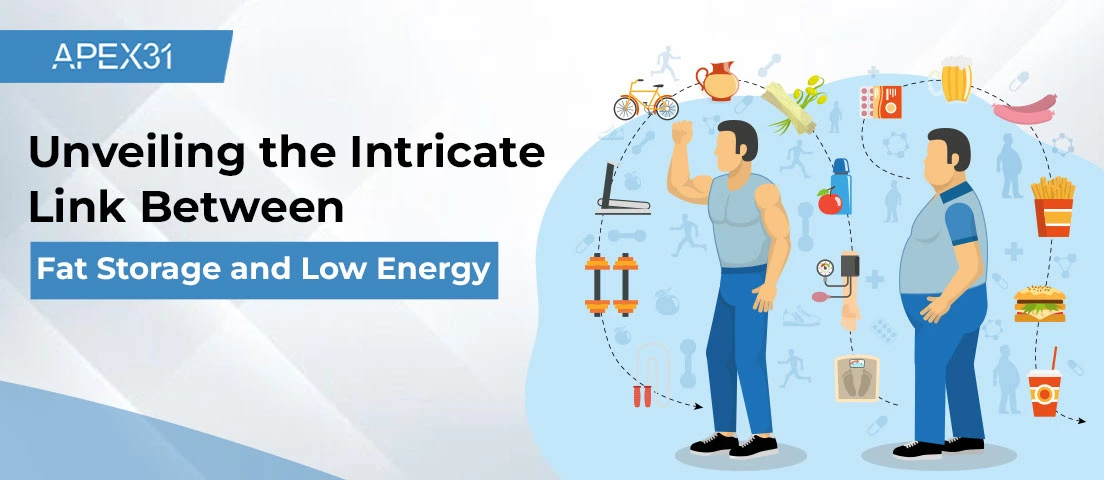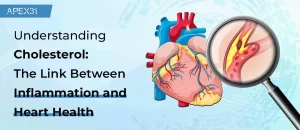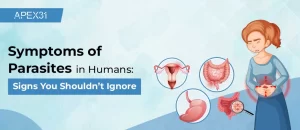Unveiling the Intricate Link Between Fat Storage and Low Energy

Obesity is one of the major threats to health and quality of life. It might have strong genetic aspects, but nowadays, even environmental aspects are promoting or accelerating this issue.
On the other hand, fat storage and low energy levels are deeply interlinked, forming a complex psychological loop that ends up creating a vicious cycle. Apart from the environmental aspects, hormonal dysfunction, chronic inflammation, and the inefficiency of energy conservation are also to be blamed for the interlink between the two.
While fat is the primary energy reserve of our body, excessive fat, especially visceral fat, can disrupt the body’s metabolic harmony.
In this blog post, we will study how fat storage and low energy are deeply interlinked. This link will further help you understand the importance of having a balanced and healthy metabolism.
How is Fat Storage and Low Energy Interlinked?
-
Cellular Inflammation:
It all starts with cells, the smallest units of life, where all essential processes occur, such as metabolism, reproduction, and response to stimuli. It is where inflammation can create problems in our body’s complex systems.
Hormone receptors like thyroid and insulin receptors are extremely important in regulating our metabolism and energy levels. When these receptors stop working due to inflammation, it can disrupt the delicate balance of energy utilization and storage.
This further results in fatigue and increased deposition of fats. Hence, cellular inflammation can silently weaken your body.
-
Thyroid Hormone Receptor Dysfunction:
Thyroid hormones, T3, and thyroxine(T4), are the most important regulators of our body’s metabolism. T4 is the major thyroid hormone, but it is largely a prohormone.
The more metabolically active form is T3. It is created when an iodine atom is removed from the T4 by enzymes called deiodinases. Afterwards, T3 travels to the cells and binds to particular receptors, also called the thyroid receptors.
Now, when these receptors face the risk of dysfunction, they can lower the body’s ability to produce adenosine triphosphate, the primary energy currency in our body. Its symptoms include fatigue, cognitive fog, and changes in hair, skin, and nail health.
Apart from that, constipation may signal underlying thyroid issues, which further promote the cycle of low energy and storage of fats.
-
Insulin Receptor Dysfunction:
Insulin is a hormone that acts as an important source of energy for the body. Its receptors are on the surface of cells and locks. When insulin binds to these receptors on muscle, liver, and fat cells, it signals the cells to open up and take in glucose from the bloodstream.
However, when these receptors are damaged, they can impact the ability of our body to utilize glucose for energy in an efficient way. Instead, excess glucose is stored as fat, which promotes the cycle of low energy and weight gain.
Not only does this insulin resistance contribute to fat storage, but it also increases the risk of metabolic disorders, especially diabetes. Thus, this resistance ends up creating a vicious cycle for your body.
-
Lifestyle and Inflammation:
While the most important aspect of weight management is energy balance(calorie intake vs outtake), the type of food we consume is also essential. A diet that consists of highly processed foods, refined carbohydrates, and unhealthy fats can also increase fat storage and inflammation.
Now, when you have poor dietary choices and a sedentary lifestyle, cellular inflammation is imminent. It can further disrupt the functions of the hormone receptor.
Even if you’re having a normal blood flow, you may also end up experiencing cellular inflammation. This highlights the insidious nature of the disease.
How to Tackle Fat Storage and Low Energy Issues That Culminate in Inflammation?
Now that the shortage of energy and fat storage are interlinked in a complicated way, healthy food consumption and supplementation(which are important) won’t be sufficient. You need to address the underlying cellular inflammation and hormonal imbalance.
With a holistic approach that addresses the root causes rather than just the symptoms, you will be able to restore hormonal balance and improve cellular function. A homeopathic program can help you rebalance hormone receptors and improve cellular health.
This approach can address the underlying causes of hormonal dysfunction and inflammation, which will further support long-term health and vitality. Beyond that, you should give more priority to rest and rejuvenation, which allows you to nurture your body from the within.
To Summarize
The intricate relationship between cellular inflammation, hormonal dysfunction, and lifestyle factors highlights the need for a holistic approach to health and vitality. Apart from just addressing the symptoms, we should go deeper to understand and resolve the root causes of low energy and fat storage.
To deal with such issues, our experts at Apex31 will help you address such root causes. By doing so, we will ensure that you feel revitalized and improve your overall health and well-being in a holistic manner.



